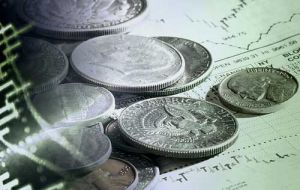MercoPress. South Atlantic News Agency
U.S. Dollar Direction In 2nd Half of 2010

The last two years have been quite volatile in financial markets. First, in the fall of 2008, it appeared that the entire global economic system was headed toward inevitable destruction as US financial institutions Bear Stearns, Fannie Mae & Freddie Mac, and Lehman Brothers all collapsed in September of ’08.
However, Central Banks gathered together and slashed interest rates to historically low levels in order to stimulate economic growth and provide liquidity to credit markets around the world, and this swift course of action proved somewhat triumphant as financial markets began to recover in March of 20009.
Then, after 6 months of steady growth and recovery, the EuroZone Debt Crisis exploded in November of 2009, and another bout of risk aversion gripped investors around the world as equity markets tumbled and the U.S. Dollar rose dramatically as investors made another flight-to-quality move. Then, in late May 2010 the European Central Bank and International Monetary Fund put a bailout fund in place for struggling EuroZone countries. Then, just as quickly as the troubles in the EuroZone began to calm in early June, very disturbing economic data began to come out of the United States that confirmed the U.S. recovery was slowing down significantly.
During June and July, the U.S. Dollar depreciated rapidly versus the Euro and Pound as investors began realizing the Federal Reserve would not be hiking rates anytime soon due to the slowing U.S. economy. Then, in late July, Fed Chairman Ben Bernanke testified before Congress and stated the Fed was considering further Quantitative Easing measures. This extremely dovish rhetoric out of the Federal Reserve served to doom the Dollar even lower.
However, the slow-down in the United States is beginning to spread. The United Kingdom is showing signs of slow-down as well, and economic data in mid-August confirmed a major slow-down in China as well. This theme of economic slow-down has served to scare investors a bit, as the U.S. Dollar had its biggest 1 week advance during the week of August 9th since the height of the EuroZone Debt Crisis. Investors do not want to hold the U.S. Dollar because of its extremely low interest rate, but if economic conditions begin to show serious systemic risk potential throughout the world, the U.S. Dollar will strengthen through the second half of 2010, and this is exactly what may happen.
The slow-down in China was expected, and most economists agree that it is needed. China’s economy is growing way too fast, and asset bubbles are beginning to form in real estate and equity markets; thus, a slow-down is not of major concern. However, China’s continued growth is very important for the economic recovery in the West because China is a major purchaser of western raw materials, and if China’s economy slow significantly, then that demand will dry up and weigh heavily on the West. Forex software can help traders learn to take advantage of these movements.
The slow-down in the U.S. and U.K., however, is not good. These economies are very fragile, and a sustained slow-down could cause major problems. The EuroZone seems to have the Debt Crisis under control, but we believe the EuroZone could be the key to U.S. Dollar strength in the second half of 2010. If the Debt Crisis reemerges, with Greece, Spain, or Portugal facing further troubles, look for a full bout of risk aversion to enter the market this fall and early winter as investors once again run for the safety of the U.S. Dollar. Many economists and large financial institutions are still calling for the Euro to be around $1.1500 by the end of the year, and if the slow-down in the U.S., U.K., and China combines with further troubles in the EuroZone, we believe that could happen in the second half of 2010.
By Cesar Zambrano - ForexFraud.com - Miami FL




Top Comments
Disclaimer & comment rulesCommenting for this story is now closed.
If you have a Facebook account, become a fan and comment on our Facebook Page!